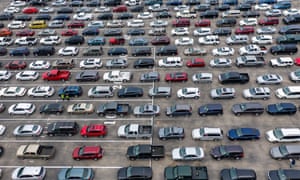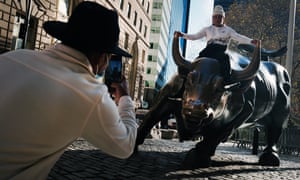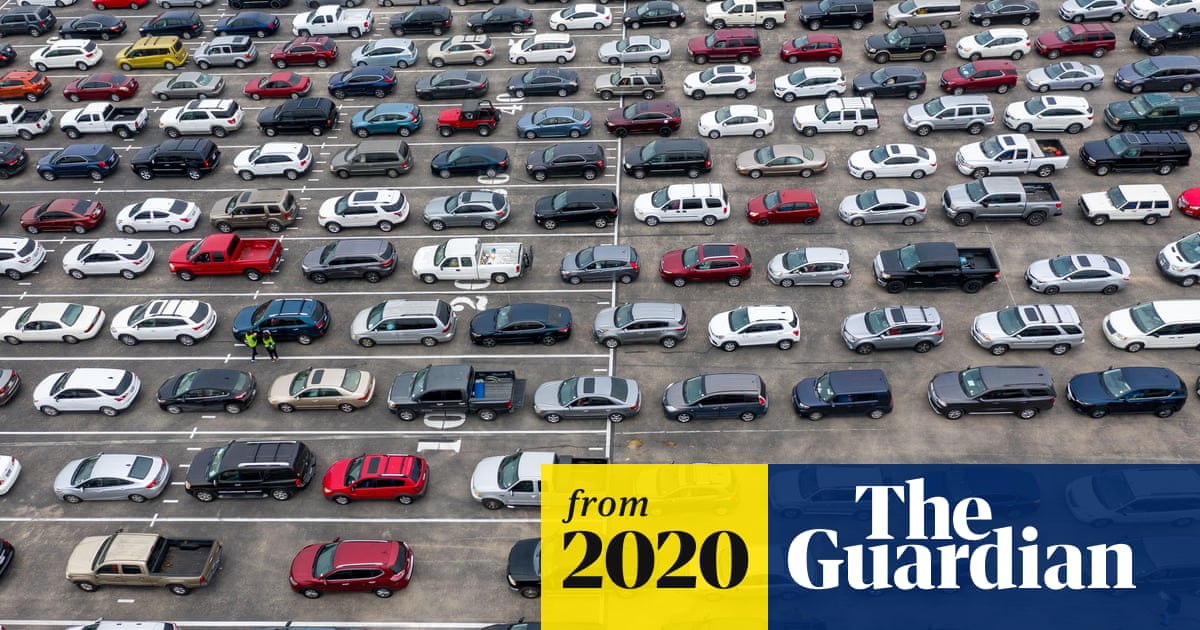SBUS-CXK
BANNED

- Joined
- Mar 18, 2016
- Messages
- 5,787
- Reaction score
- -14
- Country
- Location
Analysts predict a holiday retail boom even as unemployment hits shocking levels, particularly for Black and brown workers
Alexandra Villarreal
Tue 29 Dec 2020 06.00 EST Last modified on Tue 29 Dec 2020 06.02 EST
Shares
98

Hundreds of cars wait in line at a food distribution event amid the coronavirus outbreak in Austin, Texas, last month. Photograph: Jordan Vonderhaar/Rex/Shutterstock
Sign up for the Guardian’s First Thing newsletter
Walter Almendarez doubts there will be any presents beneath his artificial Christmas tree – not for his daughter, his nephews or anyone else.
Back in March, Almendarez reread an email over and over again, trying to process the news that he had just been let go from Los Angeles’s Chateau Marmont, where he had worked for over two decades. He was among more than 200 people fired by the swanky hotel in one fell swoop.
Trickle-down economics doesn't work but build-up does – is Biden listening?
Robert Reich

Read more
“It was just terrible, the way they did it,” he said.
Widespread local shutdowns made finding a new job practically impossible, and soon, he used up his 401(k) retirement savings just trying to pay the bills.
Like Almendarez, tens of millions of people across America are struggling to make ends meet in an economy devastated by the impact of efforts to control the coronavirus pandemic. Yet at the same time millions of other Americans are enjoying an end-of-year spending spree. The National Retail Federation is projecting that holiday sales will jump between 3.6 and 5.2% this year compared with 2019, with consumers collectively spending well over $750bn.
Advertisement
Those startling discrepancies represent a stark example of how the pandemic has exacerbated America’s already chronic inequalities, amid a widespread awakening to the country’s deep-rooted problems with economic and racial injustice.
“It is definitely something that has increased disparities between white and Black, between those well-off and less well-off – high wage, low wage. All of those things have been absolutely pulling apart,” said Elise Gould, a senior economist at the Economic Policy Institute (EPI).
During the pandemic, 651 billionaires have accrued more than $1tn in additional wealth – enough to send every American a $3,000 check and then some. But so far, that prosperity has not trickled down to 26.1 million US workers, who in November were still wrestling with direct impacts from the economic downturn, including unemployment and drops in pay.
Those hardships have disproportionately fallen on Black and brown people, who were less likely to be able to work from home even pre-pandemic. In the third quarter of 2020, the unemployment rates for Black people and Latinos were 13.2% and 11.2% respectively, compared with 7.9% for white people.
The slowdown has also caused a “shecession” for women, especially women of color, who have been overburdened with caretaking responsibilities while simultaneously watching their industries flounder.
As Americans struggle to pay rent or buy food, “the worst suffering” people can experience “could really be heading for us as we go into the end of the year”, warned Amanda Fischer, policy director at the Washington Center for Equitable Growth, a research and grant-making non-profit.
Early into the pandemic, Congress’s Cares Act, which provided $2.2tn in coronavirus aid, proved “one of the most effective anti-poverty tools we’ve seen in American history”, Fischer said. But those provisions were only temporary, and once they vanished, vehicles lined up outside food banks while renters fell months behind on their bills.
Then, when the US economy started to rebound, it did so through a “K-shaped” recovery, benefiting the rich and leaving behind almost everyone else. The stock market – where about 80% of wealth has historically been owned by the top 10% of households – continued to surge, and CEOs projected widespread confidence in the economy, despite many of them expecting to reduce their workforce and let wages stagnate.
High earners also fared well, with the employment rate for those making over $60,000 eventually eclipsing what it had been near the beginning of 2020, according to not-for-profit organization Opportunity Insights.

Facebook Twitter
Pinterest
A man sits on the Wall Street bull near the New York stock exchange, which has continued to surge despite the economic crisis. Photograph: Spencer Platt/Getty Images
Meanwhile, by mid-October, the employment rate among workers earning less than $27,000 had plummeted by 19% compared with January levels. And, as shoppers browsed online, jobseekers expecting a holiday boom were instead hit by seasonally adjusted “notable losses in retail hiring”, according to a December post by EPI.
Now, with millions of Americans still suffering even as a resurgent virus forces a new slew of lockdowns, critics are blasting Congress’s relatively modest proposed aid package, which includes a $300 supplemental weekly jobless benefit and $600 stimulus checks.
“It’s not enough. People are hungry. People are homeless,” said Anna Gifty, co-founder of the Sadie Collective, which aims to boost diversity in economics and related fields.
In an 11th-hour reversal against his own party, Donald Trump joined calls on Congress to instead offer $2,000 stimulus checks. He decried the legislation as a “disgrace”, much to the delight of Democrats, who have long advocated for a heftier aid package.
“House Democrats have fought for months to provide relief to the American people, which Republicans rejected at every turn,” said Steny Hoyer, the House majority leader. “Now that the president has agreed to direct payments of $2,000, we will ask for unanimous consent to pass a bill this week to give Americans this assistance.”
But while Capitol Hill battles it out, Almendarez is one of many distressed breadwinners bearing the brunt of their inaction, and he wishes the government would do more to help.
With about $270 worth of unemployment benefits a week, his family cannot afford their housing payments right now, much less the ingredients for their favorite holiday meal.
“We’re hurting,” he said. “And of course the country’s hurting also, because people don’t have money.”

 www.theguardian.com
www.theguardian.com
Alexandra Villarreal
Tue 29 Dec 2020 06.00 EST Last modified on Tue 29 Dec 2020 06.02 EST
Shares
98

Hundreds of cars wait in line at a food distribution event amid the coronavirus outbreak in Austin, Texas, last month. Photograph: Jordan Vonderhaar/Rex/Shutterstock
Sign up for the Guardian’s First Thing newsletter
Walter Almendarez doubts there will be any presents beneath his artificial Christmas tree – not for his daughter, his nephews or anyone else.
Back in March, Almendarez reread an email over and over again, trying to process the news that he had just been let go from Los Angeles’s Chateau Marmont, where he had worked for over two decades. He was among more than 200 people fired by the swanky hotel in one fell swoop.
Trickle-down economics doesn't work but build-up does – is Biden listening?
Robert Reich

Read more
“It was just terrible, the way they did it,” he said.
Widespread local shutdowns made finding a new job practically impossible, and soon, he used up his 401(k) retirement savings just trying to pay the bills.
Like Almendarez, tens of millions of people across America are struggling to make ends meet in an economy devastated by the impact of efforts to control the coronavirus pandemic. Yet at the same time millions of other Americans are enjoying an end-of-year spending spree. The National Retail Federation is projecting that holiday sales will jump between 3.6 and 5.2% this year compared with 2019, with consumers collectively spending well over $750bn.
Advertisement
Those startling discrepancies represent a stark example of how the pandemic has exacerbated America’s already chronic inequalities, amid a widespread awakening to the country’s deep-rooted problems with economic and racial injustice.
“It is definitely something that has increased disparities between white and Black, between those well-off and less well-off – high wage, low wage. All of those things have been absolutely pulling apart,” said Elise Gould, a senior economist at the Economic Policy Institute (EPI).
During the pandemic, 651 billionaires have accrued more than $1tn in additional wealth – enough to send every American a $3,000 check and then some. But so far, that prosperity has not trickled down to 26.1 million US workers, who in November were still wrestling with direct impacts from the economic downturn, including unemployment and drops in pay.
Those hardships have disproportionately fallen on Black and brown people, who were less likely to be able to work from home even pre-pandemic. In the third quarter of 2020, the unemployment rates for Black people and Latinos were 13.2% and 11.2% respectively, compared with 7.9% for white people.
The slowdown has also caused a “shecession” for women, especially women of color, who have been overburdened with caretaking responsibilities while simultaneously watching their industries flounder.
As Americans struggle to pay rent or buy food, “the worst suffering” people can experience “could really be heading for us as we go into the end of the year”, warned Amanda Fischer, policy director at the Washington Center for Equitable Growth, a research and grant-making non-profit.
Early into the pandemic, Congress’s Cares Act, which provided $2.2tn in coronavirus aid, proved “one of the most effective anti-poverty tools we’ve seen in American history”, Fischer said. But those provisions were only temporary, and once they vanished, vehicles lined up outside food banks while renters fell months behind on their bills.
Then, when the US economy started to rebound, it did so through a “K-shaped” recovery, benefiting the rich and leaving behind almost everyone else. The stock market – where about 80% of wealth has historically been owned by the top 10% of households – continued to surge, and CEOs projected widespread confidence in the economy, despite many of them expecting to reduce their workforce and let wages stagnate.
High earners also fared well, with the employment rate for those making over $60,000 eventually eclipsing what it had been near the beginning of 2020, according to not-for-profit organization Opportunity Insights.

Facebook Twitter
A man sits on the Wall Street bull near the New York stock exchange, which has continued to surge despite the economic crisis. Photograph: Spencer Platt/Getty Images
Meanwhile, by mid-October, the employment rate among workers earning less than $27,000 had plummeted by 19% compared with January levels. And, as shoppers browsed online, jobseekers expecting a holiday boom were instead hit by seasonally adjusted “notable losses in retail hiring”, according to a December post by EPI.
Now, with millions of Americans still suffering even as a resurgent virus forces a new slew of lockdowns, critics are blasting Congress’s relatively modest proposed aid package, which includes a $300 supplemental weekly jobless benefit and $600 stimulus checks.
“It’s not enough. People are hungry. People are homeless,” said Anna Gifty, co-founder of the Sadie Collective, which aims to boost diversity in economics and related fields.
In an 11th-hour reversal against his own party, Donald Trump joined calls on Congress to instead offer $2,000 stimulus checks. He decried the legislation as a “disgrace”, much to the delight of Democrats, who have long advocated for a heftier aid package.
“House Democrats have fought for months to provide relief to the American people, which Republicans rejected at every turn,” said Steny Hoyer, the House majority leader. “Now that the president has agreed to direct payments of $2,000, we will ask for unanimous consent to pass a bill this week to give Americans this assistance.”
But while Capitol Hill battles it out, Almendarez is one of many distressed breadwinners bearing the brunt of their inaction, and he wishes the government would do more to help.
With about $270 worth of unemployment benefits a week, his family cannot afford their housing payments right now, much less the ingredients for their favorite holiday meal.
“We’re hurting,” he said. “And of course the country’s hurting also, because people don’t have money.”

Coronavirus sharpens America's already stark economic inequalities
Analysts predict a holiday retail boom even as unemployment hits shocking levels, particularly for Black and brown workers
